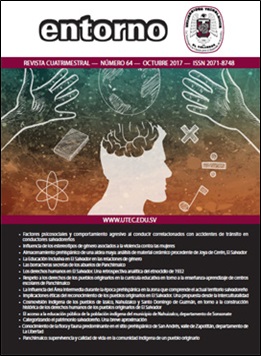Human rights in El Salvador: an analytical retrospective at the ethnocide of 1932
DOI:
https://doi.org/10.5377/entorno.v0i64.6061Keywords:
Human Rights, El Salvador - History - Peasant Uprising - 1932, Ethnic groups - History - El SalvadorAbstract
The Declaration of Human Rights emerged as a result of the events that took place before, during and after WWII. In this sense, it lays the foundation to shape the principles of respect for the individual; its main position is to declare that each person is a rational and moral being who deserves to be treated with dignity regardless of nationality, neighborhood, sex, national or ethnic origin, color, religion, language or any other condition. These are the exact same rights of the indigenous peoples. At present, the Salvadorean State constitutionally acknowledges these Native peoples; yet, there still exists inequality in their conditions within society, hence the title of this article, Human rights in El Salvador. An analytical retrospective at the ethnocide of 1932, aims to bring to light how these events generated an enormous gap among different generations of indigenous peoples in El Salvador.
Entorno, octubre 2017, número 64: 57-64
Downloads
1207
Downloads
Published
How to Cite
Issue
Section
License
© Entorno
It is required that the authors transfer the right of re-production of their articles to the Entorno Journal

